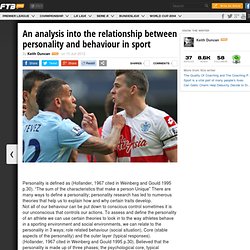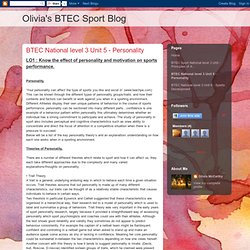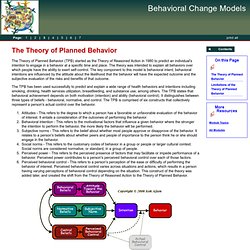

A2 Sports Psychology [iSpeakPE] A2 Sport Psychology [MyPEExam.com] Unit_3_Sport_and_Exercise_Psychology. Theories of Personality. But don't worry, we've got you covered.

If you have typed the address, make sure the spelling is correct. Most addresses are case sensitive. If you clicked on a link, it may be faulty or out of date. If you would like to report a broken link please contact us. To find the page you wanted either use the sitemap, or search for the page using the search box below. Keith. Personality is defined as (Hollander, 1967 cited in Weinberg and Gould 1995 p.30).

“The sum of the characteristics that make a person Unique” There are many ways to define a personality; personality research has led to numerous theories that help us to explain how and why certain traits develop. Not all of our behaviour can be put down to conscious control sometimes it is our unconscious that controls our actions. To assess and define the personality of an athlete we can use certain theories to look in to the way athletes behave in a sporting environment and social environments, we can relate to the personality in 3 ways; role related behaviour (social situation), Core (stable aspects of the personality) and the outer layer (typical responses).
(Hollander, 1967 cited in Weinberg and Gould 1995 p.30). Believed that the personality is made up of three phases; the psychological core, typical responses and role related behaviour. Olivia's BTEC Sport Blog: BTEC National level 3 Unit 5 - Personality. LO1 : Know the effect of personality and motivation on sports performance.

Personality. ‘Your personality can affect the type of sports you like and excel in’ (www.teachpe.com) This can be shown through the different types of personality groups/traits, and how their contents and factors can benefit or work against you when in a sporting environment. Different Athletes display their own unique patterns of behaviour in the course of sports performance, personality can be sectioned into many different parts…confidence is one example of a behaviour pattern within personality this ultimately determines whether an individual has a strong commitment to participate and achieve.
The study of personality in sport also includes perceptual and cognitive characteristics such as ones ability to concentrate and direct the focus of attention in a competitive situation when there is a pressure to succeed. Theories of Personality. -Type A vs. type B. The Type A and Type B personality theory. Neuroticism. 2. A2 PE Sp Psych Attribution Theory. A2 PE Sp Psych Personality Theory.
A2 PE - Personality Theory. Eysenck Personality Test. Arousal Stress Anxiety.mp4. The Theory of Planned Behavior. The Theory of Planned Behavior (TPB) started as the Theory of Reasoned Action in 1980 to predict an individual's intention to engage in a behavior at a specific time and place.

The theory was intended to explain all behaviors over which people have the ability to exert self-control. The key component to this model is behavioral intent; behavioral intentions are influenced by the attitude about the likelihood that the behavior will have the expected outcome and the subjective evaluation of the risks and benefits of that outcome. The TPB has been used successfully to predict and explain a wide range of health behaviors and intentions including smoking, drinking, health services utilization, breastfeeding, and substance use, among others. The TPB states that behavioral achievement depends on both motivation (intention) and ability (behavioral control).
It distinguishes between three types of beliefs - behavioral, normative, and control.